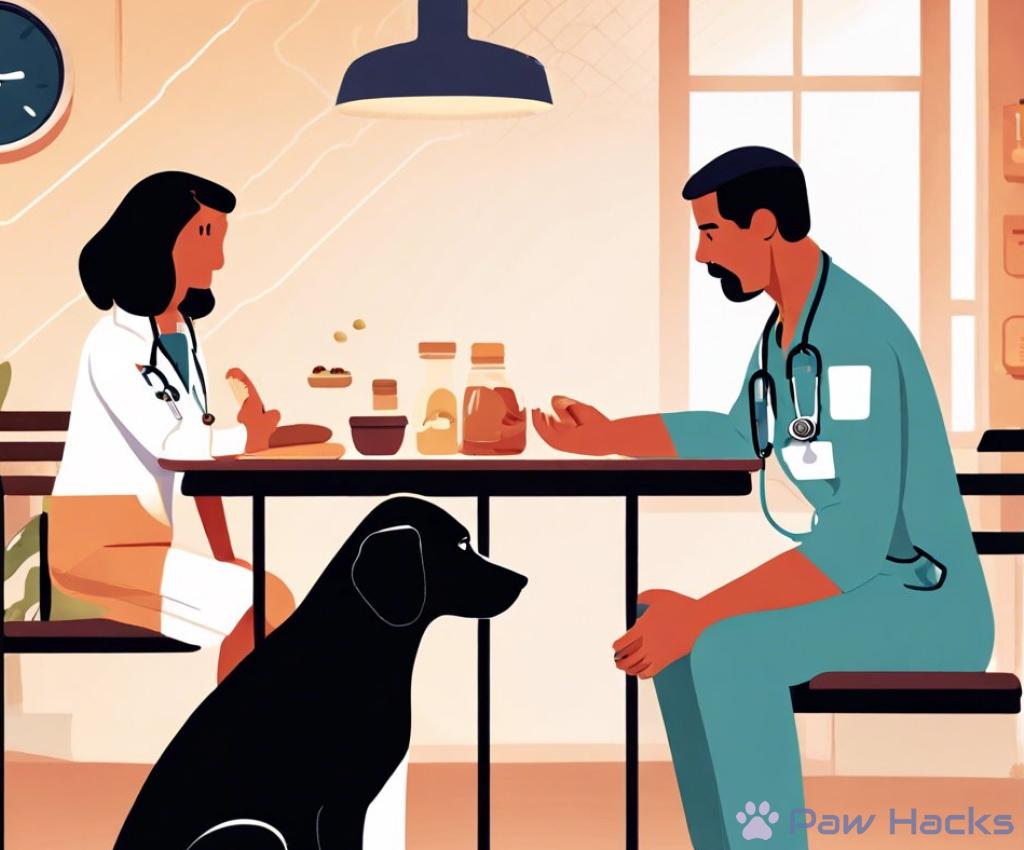Nutritional Management of Canine Pancreatitis
Understanding Canine Pancreatitis: What Every Dog Owner Should Know

Canine pancreatitis is a complex health issue that can pose serious risks to your furry friend. Understanding this condition is crucial for all dog owners, as early detection and nutritional management can make a significant difference in recovery. In this article, we will explore what pancreatitis is, its symptoms, and how to manage your dog’s diet effectively to support their health.
Identifying the symptoms of pancreatitis in dogs is the first step toward effective management. Symptoms can vary from mild to severe, and knowing what to look out for can help you get your dog the care they need promptly.
- Vomiting: Frequent vomiting is a common sign.
- Abdominal Pain: Dogs may show signs of discomfort, such as whining or reluctance to move.
- Diarrhea: Loose stools can indicate digestive distress.
- Loss of Appetite: A sudden disinterest in food is a red flag.
- Lethargy: Reduced energy levels and increased tiredness may be observed.
Nutritional management plays a pivotal role in the recovery of dogs suffering from pancreatitis. A well-balanced diet tailored to your dog’s specific needs is essential for healing and preventing future flare-ups. Here are some dietary considerations for managing canine pancreatitis:
| Food Type | Description |
|---|---|
| Low-Fat Diet | Reducing fat intake can help lessen the workload on the pancreas. |
| High-Quality Proteins | Lean proteins support recovery without stressing the digestive system. |
| Digestible Carbohydrates | Opt for easily digestible carbohydrates to provide energy. |
| Hydration | Ensure your dog has access to plenty of fresh water. |
It’s vital to consult with your veterinarian to develop a customized diet plan that suits your dog’s specific condition and needs.
The Power of a Balanced Diet: Essential Nutrients for Dogs with Pancreatitis

When it comes to managing canine pancreatitis, a balanced diet is not just beneficial; it is essential for recovery and well-being. A carefully structured diet can help alleviate the burden on the pancreas while ensuring that your dog receives all the necessary nutrients to thrive. Understanding the specific nutrients that play a pivotal role in this process can empower dog owners to make informed decisions about their pet’s diet.
Proteins are the building blocks of cells and play a significant role in the recovery of dogs suffering from pancreatitis. However, not all proteins are created equal. Opting for high-quality, lean protein sources is crucial as they are easier for dogs to digest and can support tissue repair without placing undue stress on the digestive system. Foods like chicken, turkey, and certain fish varieties are excellent choices that can enhance recovery while ensuring that your dog remains energetic and healthy.
Carbohydrates are another vital component of a balanced diet for dogs with pancreatitis. Choosing easily digestible carbohydrates, such as white rice or sweet potatoes, can provide the necessary energy without overwhelming the digestive system. Additionally, incorporating a moderate amount of fiber can aid in healthy digestion and promote gut health. Fiber-rich foods, like pumpkin or certain vegetables, can help regulate bowel movements and support overall digestive function, making them a wise addition to your dog’s diet.
Lastly, hydration is key. Ensuring that your dog has access to fresh, clean water at all times is crucial for optimal health, particularly when they are recovering from pancreatitis. Dehydration can exacerbate symptoms and hinder recovery, so keeping your dog well-hydrated is a simple yet powerful way to support their health.
Feeding Strategies: How to Safely Introduce Food After a Pancreatitis Episode
After a pancreatitis episode, it is crucial to approach the reintroduction of food with caution. Dogs recovering from this condition often have sensitive digestive systems, making it essential to start with small, frequent meals rather than reverting to their usual feeding schedule. This gradual reintroduction helps to assess how well your dog tolerates food without overwhelming their recovering pancreas. Begin by offering a bland diet, consisting of easily digestible ingredients like boiled chicken or white rice, which are gentle on the stomach.
As you cautiously introduce food, keep a close eye on your dog’s reaction. Look for any signs of discomfort, such as vomiting or diarrhea, which could indicate that the food is not suitable. If your dog handles the initial bland diet well, you can gradually incorporate high-quality proteins and carbohydrates into their meals. Progressively adding one new ingredient at a time allows you to pinpoint any potential triggers for adverse reactions. Remember, the goal is to ensure that your dog can enjoy their meals without compromising their health.
Once your dog has successfully tolerated the initial reintroduction of food, focus on establishing a long-term feeding routine that supports their health and well-being. This includes maintaining a low-fat diet to alleviate stress on the pancreas. Create a structured feeding schedule with specific meal times, as this can help regulate digestion and prevent overeating. Additionally, consider consulting with your veterinarian to tailor a long-term diet plan that meets your dog’s unique needs while supporting their recovery.
Supplements and Alternatives: Boosting Your Dog’s Recovery with Nutritional Support
When addressing the challenges posed by canine pancreatitis, nutritional supplements can serve as valuable allies in your dog’s recovery journey. These supplements are designed to fill potential gaps in nutrients that may arise due to dietary restrictions. For instance, omega-3 fatty acids, often derived from fish oil, are renowned for their anti-inflammatory properties. Incorporating such supplements can help mitigate inflammation in the pancreas and promote healing. However, it’s essential to consult your veterinarian before introducing any new supplements to ensure they align with your dog’s specific needs.
Aside from standard supplements, there are alternative nutritional sources that can enhance your dog’s diet and support their recovery. For example, probiotics play a significant role in restoring gut health, especially after an episode of pancreatitis. These beneficial bacteria can aid digestion and improve nutrient absorption, making them a beneficial addition to your dog’s regimen. You might also consider digestive enzymes, which can assist in breaking down food more efficiently, thereby reducing the strain on the pancreas.
Integrating these supplements and alternatives into your dog’s daily feeding routine can be a game-changer. Gradually introduce these new components, monitoring your dog’s response closely. This approach not only helps in identifying any adverse reactions but also enables you to tailor your dog’s diet more effectively. Remember, the goal is to support their overall well-being while ensuring that their nutritional needs are met without overburdening their digestive system. By carefully balancing their diet with the right supplements, you can significantly enhance your dog’s recovery prospects and quality of life.
Long-Term Nutritional Care: Preventing Recurrences of Pancreatitis in Dogs
Managing canine pancreatitis is not just about addressing the immediate health concerns; it also involves a thoughtful approach to long-term nutritional care. This ongoing management is essential for preventing recurrences of pancreatitis, allowing your furry friend to live a healthy and vibrant life. By committing to a balanced and consistent diet, you can significantly reduce the risk of future flare-ups and promote overall wellness.
Establishing a Consistent Diet is paramount in supporting your dog’s long-term health. After a pancreatitis episode, it’s crucial to work closely with your veterinarian to devise a diet plan that emphasizes low-fat options and high-quality, easily digestible ingredients. Maintaining a consistent feeding schedule can help regulate your dog’s digestion and prevent overeating, which is a common trigger for pancreatitis. By sticking to a carefully crafted diet, you not only provide your dog with the necessary nutrients but also help their digestive system function optimally.
In addition to a consistent diet, Monitoring Body Condition plays a vital role in long-term care. Regularly assess your dog’s weight and overall body condition to ensure they are neither underweight nor overweight. Dogs that are overweight are at a higher risk of developing pancreatitis due to the added stress on their organs. Adjusting their diet and exercise routine based on their body condition can help maintain a healthy weight, further reducing the likelihood of future pancreatitis episodes. Keep in mind that gradual weight loss is more effective than rapid changes, as it minimizes stress on the body.
Incorporating Proactive Measures is another essential strategy in preventing recurrences. This includes routine veterinary check-ups to monitor your dog’s health and catch any potential issues early. Your veterinarian may recommend specific supplements such as omega-3 fatty acids or probiotics that can bolster your dog’s digestive health and overall well-being. These supplements can assist in mitigating inflammation and supporting gut flora, making them valuable additions to your dog’s long-term nutritional strategy.
Ultimately, the key to preventing recurrences of pancreatitis lies in a comprehensive and proactive approach to your dog’s nutrition. By committing to consistent dietary practices, monitoring their health closely, and integrating supportive measures, you can help your dog enjoy a happier, healthier life free from the pain of pancreatitis.
Share this content:



